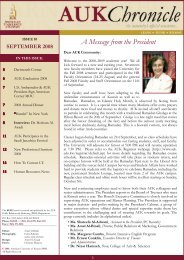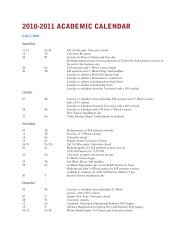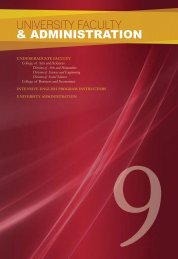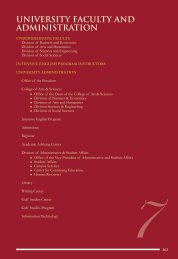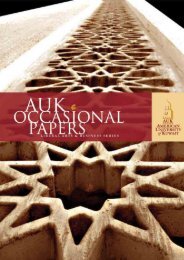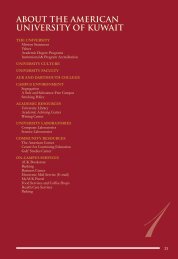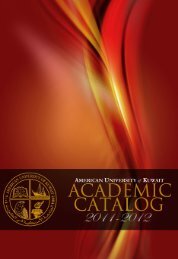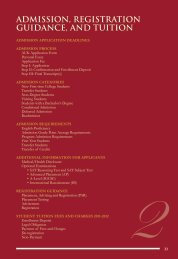college work and have inadequate preparation in English.Limited access to remedial, academic help for weakerstudents and a shortage of student advisors exacerbatethe problem. Students frequently live with their parentsor other family member and commute from their family’shomes where a relatively high standard of living isenjoyed. Students appear to have ample time to focus onstudying and to be free from financial worries. However,faculty members complain about lax student attitudestowards attendance, their studies and that plagiarism,cheating on exams and grade negotiations are rife.Until now, there have been few incentives for academicexcellence; e.g. securing a well-paying job after graduationis customarily more associated with wasta, a practice thatuses personal or influential connections of a family memberor associate. However, traditional avenues of employmentsuch as the government are tapering off. When pressed,students, especially males, often concede that they worryless about securing a good job than obtaining a degreeto improve their social status or enhance their marriageprospects. In sum, studying often does not appear tooccupy an important role in the students’ daily lives andfamilial obligations are often cited for not studying.3.0 Literature Review:3.1 Factors Leading To Western Liberal EducationDemandCurrently, the Gulf region is experiencing tumultuousgrowth in secondary and post secondary private schoolsand universities. Private universities represent about 27%of the 149 university affiliated with the Association ofArab Universities. Many of the current and future startupsof private universities are envisioned for the Gulf.The demand for imported Western liberal education hasincreased in the Gulf because of several contributingfactors. First, from the 1970’s onwards, the region sawthe demise of the Egyptian influenced system and a shiftto the credit point system prominent in the Americaneducation system (Mazawi, 2004). Secondly, the qualityassurances for training and research are seen as higherin US universities than elsewhere. Thirdly, even before9/11, the relative numbers of Arab students studyingin the United States were on the decline resulting in acumulative 30% drop from 1999 to 2002 (Derhally, 2003).Taken together, these factors have increased the demandfor local western liberal education as Middle Easternstudents find it harder to pursue studies in the West.A less examined, but increasingly important reason for theprivatization of higher education in the Gulf is that theregion’s established public institutions of higher educationare finding themselves unable to accommodate theirburgeoning, young populations, (especially expatriates)under the mounting shortages of professional educatorsand limited public resources dedicated to higher education.The brunt of future investment associated with highereducation will likely be borne by the private sector owingto its flexibility in coping with the changing demographics,shifting budget priorities of Gulf governments, privatemarket needs, and because of the potential for growingfinancial returns. For example, one Kuwaiti educationcompany boasting 27,000 students at all levels, reputedlyearned about $35 million in fiscal year 2004.Finally, educators have been imported from other countriesto the Gulf owing to historical shortages of local teachingprofessionals. Various nationalities including Egyptians,British, Indians, and others have preceded U.S. citizensas administrators and teachers. With the increasingparticipation and presence of the U.S. in the Gulf, comesincreased impetus and means for synchronizing educationin the region with the political and economic system overwhich the U.S. currently holds hegemonic presence.One American consultant in the United Arab Emiratesnoted that a new university ,”is designed to reflect thetypical design of colleges and universities in the US…tofacilitate transfers to US institutions and entrance to USgraduate programs.”(Mazawi, 2004)3.2 Transferability of Western Liberal EducationThe quest for educational change, from a Gulf Arabperspective, might be summarized as how to bestmodernize Gulf education without disrupting orchanging its traditional social structures. Implicit in thisview is that elements in western liberal education canbe appropriated without having to resort to a wholesaletransfer. Education transfer, to use an analogy, becomesa smorgasbord of sorts where the desired elements areselected and less desirable ones are left off the plate. Theanswer to the implicit question as to whether culturalelements act as a facilitating or restraining agent tomodernization seems to stand on end. Wolfgang Zapf(2004) in his examination of modernization process inthe context of the Middle East suggests that since there isno unified Islamic front, it can be expected that there willbe different kinds and rates of adoption of technology(and by inference, education). However, this observation25
26glosses over the filtering effects of cultural variables.For example, one study of technological transfer to theMiddle East suggests that culture variables tend to act as afilter of sorts in information technology transfer (Straubet.al, 2003).While unexamined here, the theoretical underpinningharkens back to an old debate between modernizationand dependency proponents: Can rational practicesbased on the idealized meritocracy replace practicesbased on traditional notions of kinship and affiliation?In this context, can liberal western style education beadapted to the Gulf without having to resort to an “all ornothing” adoption approach? If traditional societies takea smorgasbord approach to the transfer of western liberaleducation and the resulting arrangement works, it is trulylike having ones cake and eating it, too.3.3 The Compatibility of Liberal Western Education’sAssumptions and OutcomesWestern liberal education is a relative newcomer to ArabGulf settings although its roots can be traced back toAristotle’s writings about education. According to theAmerican Association of Colleges and Universities(AAC&U),A truly liberal education is one that prepares us to liveresponsible, productive, and creative lives in a dramaticallychanging world. It is an education that fosters a wellgrounded intellectual resilience, a disposition towardlifelong learning, and an acceptance of responsibility forthe ethical consequences of our ideas and actions… [It]requires that we understand the foundation of knowledgeand inquiry about nature, culture, and society…Whatmatters in liberal education is substantial content, rigorousmethodology, and an active engagement with the societal,ethical, and practical implications of our learning”.(AAC&U, 1998)This brings us to the fore of our inquiry about thecompatibility of western liberal education ideals withthe culture and traditions of the Arabian Gulf setting.Conservative settings are not necessarily inhospitable tothe cherished ideals of western liberal education such astolerance and free thinking, but several cultural tensionschallenge the viability of liberal Western-style educationinstitutions in the Gulf. These include:• Knowledge precepts concerning acceptable knowledgeversus knowledge for knowledge’s sake.• The relative emphasis placed on collective versusindividual identity.• The extent of reliance on mechanical versus organicmeans of problem resolution and its correspondingrelationship to organizational development withineducational settings.3.4 Knowledge PreceptsThe philosophy behind Western-style liberal education andknowledge acquisition can be summed up as knowledgefor knowledge’s sake. By contrast, knowledge acquisitionin Islamic societies stems from the principle thatknowledge be acceptable, i.e. praiseworthy, permissibleand not blameworthy. J.M. Halsted (2004) believes thatIslamic education and western educational philosophies arefundamentally incompatible. While the Prophetic reports(Hadith collections) indicate that knowledge without anyreal use in human life is useless, the Quran seems to suggestthat any knowledge that contributes to one's personaldevelopment is considered valuable. Utility, in that sense,is left up to the individual and the society to decide upon.There appears to be a growing body of opinion thatsuggests that it is not the Quran, but its diverse culturalinterpretations that are responsible for the emergenceof oppositional thinking between Islamic and westerneducational values (Bagheri and Khosrawi, 2006). In theabsence of any resolution to this underlying knowledgedilemma, Gulf students, perhaps, like other Muslimsconfronting conflictive western values, appear to havedeveloped dual frames of reference and communication,one local-traditional and the other, global-modern(Findlow, 2001). Suffice it to say that instead of a synthesisof Arab cultural and religious heritage with growingWesternization of lifestyles, two separate accounts arekept, much like keeping two sets of accounting books;each used for differing circumstances and needs.3.5 Individual versus Collective IdentityAnother factor that Western-style education institutionschallenge is the difference in relative emphasis on individualidentity versus collective identity. It is supposed that individualidentity is encouraged along with critical thinking inwestern intellectual life. In contrast, the literature suggeststhat traditional Islamic education is largely teacher andtext-oriented and by extension, emphasizes collectiveidentity and rote learning skills over individual identityand critical analysis skills. This emphasis comes out of themadressa (Islamic school) tradition for learning about Islam and theQuran, a method where knowledge is transmitted by rote
- Page 2 and 3: About AUK Occasional Papers:The AUK
- Page 4 and 5: higher education is distinguished b
- Page 6 and 7: The Impact of a Glass Ceilingon Wom
- Page 8 and 9: more women a chance to flourish in
- Page 10 and 11: consider other factors such as the
- Page 12 and 13: academically unprepared…you must
- Page 14 and 15: EmotionalSignificant variations in
- Page 16 and 17: Advising and OrientationOther impor
- Page 18 and 19: etention. However, in addition, the
- Page 20 and 21: Hadi and Llabre (1998) assessed int
- Page 22 and 23: the event was encoded in parallel a
- Page 24 and 25: Public Health Impacts of Iraq’s 1
- Page 28 and 29: memorization and repetition. This a
- Page 30 and 31: other in the pursuit of higher grad
- Page 32 and 33: for quality assurance, an organizat
- Page 34 and 35: RethinkingEntrepreneurship:Integrat
- Page 36 and 37: This type of training leads to enha
- Page 38 and 39: In short, Mount Allison students ha
- Page 40 and 41: Joplin, L. (1995). On defining expe
- Page 42 and 43: Figure 1. ExperientialEntrepreneurs
- Page 44 and 45: Kuwait - satellite television, cult
- Page 46 and 47: ReferencesAbt, V. & Seesholtz, M. (
- Page 48 and 49: interest in continuing to manipulat
- Page 50 and 51: Though corruption poses fundamental
- Page 52 and 53: A Cross-Cultural Modelof Innovation
- Page 54 and 55: were conceived as associations of c
- Page 56: others. In this case, confident pos
- Page 59 and 60: 58REFERENCESAmason, A. (1996) ‘Di
- Page 61 and 62: Shelton, C. and Darling, J. (2004)
- Page 63 and 64: 62• recycle natural resources use
- Page 65 and 66: 64Table Kuwait Fact Profile on Tran
- Page 67 and 68: Table Transportation and Associated
- Page 69 and 70: 68• Third, each mode of transport
- Page 71 and 72: 70• Prepare a Bank Group transpor
- Page 73 and 74: 7219. Stratford,A. (1974). Airports
- Page 75 and 76: 74may be developed in a safe and or
- Page 77 and 78:
28. Tables - 1 Environmental Manage
- Page 79 and 80:
6) EnvironmentalAwarenessNo baselin
- Page 81 and 82:
80Iran, the US, and HighlyEnriched
- Page 83 and 84:
82since the 1951 nationalization of
- Page 85 and 86:
8450% of the population is astonish
- Page 87 and 88:
86The US also approved the Shah’s
- Page 89 and 90:
88George W. Bush’s State of the U
- Page 91 and 92:
90when Iran could not keep up with
- Page 93 and 94:
92rich states, the decrease of natu
- Page 95 and 96:
94indigenous training. Specifically
- Page 97 and 98:
96It is important to note that Russ
- Page 99 and 100:
Table 1: Nuclear Powered States and
- Page 101 and 102:
100Foucault, Michel. “What are th
- Page 103 and 104:
102Ramazani, Rouhollah K. “Iran
- Page 105 and 106:
104My SCORE, OurMATCH: CommunityPar
- Page 107 and 108:
106with a mate while he does mechan
- Page 109 and 110:
108dimensions of life including for
- Page 111 and 112:
correlated to the commitment and on
- Page 113 and 114:
REFERENCESBryce, J, Frigo, T, McKen
- Page 115 and 116:
GDP $21,300, GDP growth rate 6.8%,
- Page 117 and 118:
• Less than half of the people su
- Page 119 and 120:
118TABLE 4: # 1 Gulf Country in Eco
- Page 121 and 122:
120• More men than women indicate
- Page 123 and 124:
TABLE 8: Why? X GenderGENDERMALE FE
- Page 125 and 126:
TABLE 11: Success in improving Livi
- Page 127 and 128:
TABLE 14: Success in preserving Cul
- Page 129 and 130:
• Gender wise, more men felt that
- Page 131 and 132:
TABLE 18: How foreign workers are t
- Page 133 and 134:
• In terms of the preference of e
- Page 135 and 136:
TABLE 24: Should Oil be the Basis f
- Page 137 and 138:
F i gur e 18: S hould K uwa it J oi
- Page 139 and 140:
13811. What do you think about the
- Page 141 and 142:
140Conditions of Kuwaiti Dependence
- Page 143 and 144:
1422) if the alien has no means of
- Page 145 and 146:
144offered Mubarak recognition as a
- Page 147 and 148:
146labor regulations and enforcemen
- Page 149 and 150:
148intensifying suspicion and hosti
- Page 151 and 152:
150Commission on Freedom of the Pre
- Page 153 and 154:
Even the viceroy of India, Lord Cur
- Page 155:
Christine PiconeAustralian College



